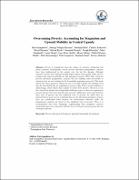| dc.description.abstract | Poverty in Uganda has been the subject of extensive scholarship and
policy attention. Subsequently, several poverty alleviation programmes/ projects
have been implemented in the country over the last five decades. Although
successive surveys have reported notable improvements in the quality of life, there is
evidence that many households are still stagnating in poverty. Why? How come the
poverty alleviation programmes/ projects that are enabling some households to
transit poverty are not working for the households stagnating in poverty? This study
delved into these questions, taking the case of Central Uganda. The findings were
that the households that are stagnating in poverty suffer from a broad syndrome of
disadvantage, which affects their capacity to transit from poverty. However, it was
also found that, despite their indisputable challenges, many of them are stagnating in
poverty because they don’t feel that they are poor. Differences were noted between
their view of poverty and the traditional view of poverty (by which they are
characterized as poor). It was concluded that poverty alleviation programs/ projects
have not transformed them because the interventions delivered under the
programmes/ projects are based on the traditional view of poverty. Thus, it is
recommended that those designing/ implementing these programs/ projects
synchronize their view of poverty with the views of the poor whose poverty they are
working to alleviate. | en_US |



